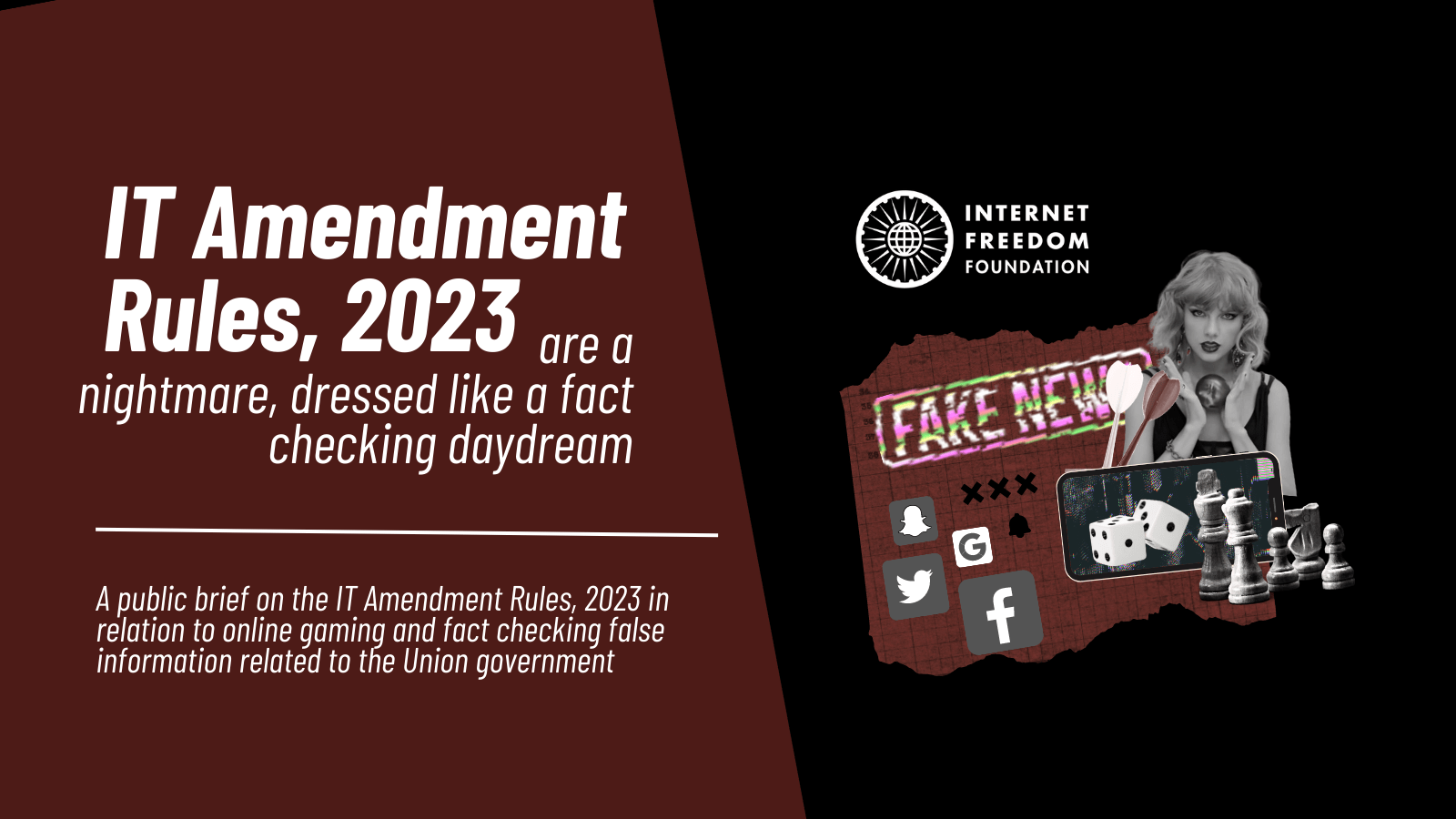
tl;dr
On April 06, 2023, the Union Government notified amendments to the Information Technology (Intermediary Guidelines and Digital Media Ethics Code) Rules, 2021 (“IT Amendment Rules, 2023”). The IT Amendment Rules, 2023 mainly regulate online gaming as well as fact checking of “false”, “fake” or “misleading” information related to the Union Government. Among the various amendments, the most alarming one provides for the establishment of a fact check unit (“FCU”), established at the sole discretion of the Union government, aimed at fact checking online information related to the Union government. In this Public Brief on the IT Amendment Rules, 2023, we highlight the significant changes introduced with the notified amendments and analyse the hits and misses.
Why should you care?
As a result of these amendments, information about the Union government will essentially be fact checked by the government itself, through an FCU established by it. Not only does this violate the principles of natural justice, wherein one can’t be the “judge in their own cause”, but also poses a huge threat to online free speech and the right to receive information online. The IT Amendment Rules, 2023 are a consequence of the Ministry of Electronics and Information Technology’s (“MeitY”) continued efforts to impose obligations on online intermediaries, in the name of increasing accountability - while in reality infringing the freedom of speech and expression. Additionally, the online gaming rules also face the age-old criticisms the IT Rules, 2021 have become used to - with over-broad provisions enabling executive overreach.
Background
On December 23, 2022, the Government of India notified a change in the Allocation of Business Rules, designating the MeitY as the nodal ministry for online gaming. Within two weeks, on January 02, 2023, MeitY proposed amendments seeking to expand the scope and application of the original IT Rules, 2021 to regulate online gaming (“Proposed Amendments”). (For more details, see our First Read and consultation response.)
During the consultation process for the Proposed Amendments, 2023, MeitY proposed yet another amendment to the IT Rules, on January 17, 2023 (“Revised Amendments, 2023”). These sought to introduce a new category for the take down of online content by intermediaries, i.e. any information that has been identified as ‘fake’ or ‘false’ by the Press Information Bureau (PIB), or any other agency of the Union Government, to which the news story relates. (For more details, see our First Read and consultation response).
On April 06, 2023 - roughly 3 months later - the Union government notified these amendments with some modifications.
Fact Checking Amendments
Back in October 2022, MeitY notified the first round of amendments to the IT Rules, 2021 (“IT Amendments, 2022”), which amended Rule 3(1)(b)(v) to include the phrase, “shall make reasonable efforts to cause the user […] not to host […] or share […]” and included the term “misinformation” in the amended sub-clause 3(1)(b)(v) which read, “ intentionally communicates any misinformation or information which is patently false and untrue or misleading in nature;” As we stated in our Public Brief on the IT Amendment Rules, 2022, Tthese amendments obligated intermediaries, including social media intermediaries, to decide on what information is communicated intentionally on their platforms - which could lead to subjective and arbitrary censorship. Now, under the IT Amendment Rules, 2023, the due diligence requirements of intermediaries have been amended even further. Read with the IT Amendment Rules, 2022, Rule 3(1)(b)(v) now states that an intermediary must “make reasonable efforts to” cause its users to not post information in respect of any business of the Union Government that is identified as “fake”, “false”, or “misleading” by the FCU established by the Union government. Notably, “business” of the Union government and “fake, false, or misleading” remains undefined throughout the Rules.
- The consultation process: The noticeable changes in the amended rules as compared to the Revised Amendments is the removal of clarification on the “business of the Central Government,” which was originally meant to apply to any business transacted under the rules of business made under Article 77(3) of the Constitution. The IT Amendment Rules, 2023 also supposedly acknowledges the concerns surrounding the appointment of the PIB FCU as the arbiter of labelling “fake news” on the internet by eliminating the PIB FCU as the authority for fact-checking under the amended Rules. Nonetheless, this modification fails to address the wider predicaments associated with the said provision - like the excessive delegation of executive power, or rendering the Union Government the final arbiter of free speech on the internet.
- The legal challenge: The IT Amendment Rules, 2023 introduces new grounds for taking action against content under Rule 3(1)(b)(v), and even fails to define the grounds, i.e. “fake”, “false”, and “misleading”. This introduces vague grounds for blocking content hosted by intermediaries, and violates both the Shreya Singhal v. Union of India (2013) judgement and the spirit of Section 69A of the Information Technology Act, 2000 (“IT Act, 2000”). The IT Amendment Rules, 2023 thus seek to establish a new procedure for internet censorship, circumventing safeguards, by introducing a third avenue for passing blocking orders. A separate petition, filed by IFF, challenging the constitutional validity of this provision was filed before the Bombay High Court on April 11, 2023. The Bombay High Court had directed MeitY to file its response by April 19, 2023 on why the IT Amendment Rules, 2023 should not be stayed, and also describe the factual background that necessitated the issuance of the amendments.
- The implication: The implication for intermediaries who chose to not observe or fail to take action related to the due diligence requirements under the amendment would risk the loss of their “safe harbour” protections, provided under Section 79 of the IT Act, 2000. Many journalists and media organisations, such as the Editor’s Guild of India, Indian Newspaper Society, Asia Internet Coalition, etc, have expressed alarm at the notification of these IT Amendment Rules, 2023, specifically in the context of the loss of the safe harbour provisions. The nature of the censorship being proposed by the fact-checking amendments under the IT Amendment Rules, 2023, could vastly affect the nature of free speech on the internet - most importantly in the context of dissent.
Online Gaming Amendments
The IT Amendment Rules, 2023, introduce several new definitions and classification thus increasing clarity in several instances, and also limit several obligations to certain categories or class of entities thus reducing compliance burden on all entities. This has broadly been an improvement in comparison to the Proposed Amendment, 2023. However, as we stated in our consultation response to the proposed amendments, the logical reasoning and justification behind introducing yet another category of intermediaries, i.e. online gaming intermediary, has not been shared by the Ministry.
- Ambiguous definitions: The definition of online gaming intermediaries still remains very broad, and thus leads to ambiguity. The IT Amendment Rules introduces a categorisation of “online real money game” and states that one of the various criterias for certifying a game as “permissible online real money game” is that it should not involve ‘wagering on any outcome’. Some individuals have observed that “wagering” has not been elaborated upon anywhere in the Rules, thus leaving the classification of such games up to the understanding of the self regulatory body (“SRB”). The notified amendments also introduce changes to Rule 3(1)(b), imposing fresh obligation on intermediaries to not host, upload, or publish information in the nature of a non-permissible online game [sub-clause (ix)] and advertisements, surrogate advertisements, or promotion of a non-permissible online game [sub-clause (x)].
- Flawed model of self-regulation: Rule 2(1)(qc) provides for the establishment of an “online gaming self-regulatory body” which will apply to any entity designated as such under Rule 4A, which pertains to “verification of online real money games”. Meity, as per Rule 4A, may now designate as many online gaming self-regulatory bodies as it may consider necessary for the purposes of verifying an online real money game as a permissible online real money game. Thus, most obligations on the self-regulatory bodies have become limited to online real money games, as opposed to the Proposed Amendments, 2023, which didn’t have any such distinction. MeitY may however, on certain grounds, extend obligations limited to the online real money games to non-real money games as well, thus creating the risk of a one-size-fits-all approach.
- Legislative uncertainty: Online gaming was not previously regulated under the provisions of the IT Act, 2000. Although the government notified a change in Allocation of Business rules designating MeitY was appointed as the nodal ministry for online gaming, while this confers administrative clarity on which ministry gets to administer the sector, it does not, in fact, create the power to exercise it. For this, a clear parliamentary enactment is necessary. However, instead of going to parliament, the IT Rules framed under the IT Act seek to expand the scope of regulation under the purview of the IT Act to include online gaming. Hence the regulation of online gaming entities via such Rules issued by the executive, without parliamentary deliberation, is misguided, undemocratic, and may even be unconstitutional.
Conclusion
The IT Rules, 2021, which already grant the government great authority over various entities on the internet, will further become susceptible to abuse now that the Rules have been amended. Such a degree of regulation by the Union government is highly violative of democratic principles in India and will strongly threaten press freedom by increasing censorship possibilities in India. We have since February 2021 called for the recall of the unconstitutional, illegal, undemocratic IT Rules, 2021 and continue to do so for the amendment IT Rules, 2023.
Important Documents
- IT Amendment Rules, 2023 (link)
- IFF’s Public Brief on the IT Amendment Rules, 2023 (link)
- IFF’s statement on the IT Amendment Rules, 2023 (link)
- Writ petition in Kunal Kamra v. Union of India (link)
- Bombay HC order dated 11.04.2023 (link)
- IFF’s members’ briefing call on the IT Amendment Rules, 2023 (link)
- Proposed Amendments to the IT Rules in relation to online gaming (link to the Rules; link to our consultation response)
- Revised Amendments to the IT Rules in relation to PIB fact checking (link to the Rules; link to our consultation response)
- IT Amendment Rules, 2022 (link)
- IFF’s Public Brief on the IT Amendment Rules, 2022 (link to the blogpost; link to brief)


